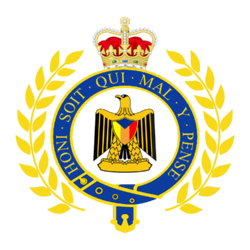Difference between revisions of "Privy Council of Great Alemonia"
(Created page with "{{Infobox organization | name = His Lordship's Most Honourable Privy Council | logo = AlemoniaSeal.png | logo_size = | abbreviation...") |
|||
| Line 1: | Line 1: | ||
{{Infobox organization | {{Infobox organization | ||
| − | | name = His | + | | name = His Excellencies Most Honourable Privy Council |
| logo = AlemoniaSeal.png | | logo = AlemoniaSeal.png | ||
| logo_size = | | logo_size = | ||
| Line 17: | Line 17: | ||
}} | }} | ||
| − | ''' | + | '''His Excellencies Most Honourable Privy Council''', usually known simply as the '''Privy Council''', is a formal body of advisers to the Lord President of the [[Nation/Great Alemonis|Great Alemonia]]. Its membership mainly comprises senior politicians, who are current or former members of either the [[Parliament of the Federal Republic of Great Alemonia|House of Commons]] or the [[Parliament of the Federal Republic of Great Alemonia|House of Lords]]. |
| − | The Privy Council formally advises the | + | The Privy Council formally advises the Lord President on the exercise of the Supreme Prerogative, and corporately it issues executive instruments known as Orders in Council, which among other powers enact Acts of Parliament. The Council also holds the delegated authority to issue |Orders of Council, mostly used to regulate certain public institutions. The Council advises the sovereign on the issuing of Supreme Charters, which are used to grant special status to incorporated bodies, and city or borough status to local authorities. Otherwise, the Privy Council's powers have now been largely replaced by the Cabinet of Great Alemonia. |
| − | Certain judicial functions are also performed by the Queen-in-Council, although in practice its actual work of hearing and deciding upon cases is carried out day-to-day by the | + | Certain judicial functions are also performed by the Queen-in-Council, although in practice its actual work of hearing and deciding upon cases is carried out day-to-day by the Judicial Committee of the Privy Council. The Judicial Committee consists of senior judges appointed as Privy Counsellors: predominantly Justices of the Supreme Court of the United Kingdom. |
Revision as of 08:42, 18 June 2017
 | |
| Abbreviation | Privy Council, PC |
|---|---|
| Predecessor | The Imperial Council |
| Legal status | Non-executive advisory body |
| Headquarters | 10 South Street, Port Ross |
| Barbillus Cogidubnus Caecilius | |
Lord President of the Council |
Timothy Brooks, Lord Brooks |
Clerk of the Council |
Desmond Hitchins |
His Excellencies Most Honourable Privy Council, usually known simply as the Privy Council, is a formal body of advisers to the Lord President of the Great Alemonia. Its membership mainly comprises senior politicians, who are current or former members of either the House of Commons or the House of Lords.
The Privy Council formally advises the Lord President on the exercise of the Supreme Prerogative, and corporately it issues executive instruments known as Orders in Council, which among other powers enact Acts of Parliament. The Council also holds the delegated authority to issue |Orders of Council, mostly used to regulate certain public institutions. The Council advises the sovereign on the issuing of Supreme Charters, which are used to grant special status to incorporated bodies, and city or borough status to local authorities. Otherwise, the Privy Council's powers have now been largely replaced by the Cabinet of Great Alemonia.
Certain judicial functions are also performed by the Queen-in-Council, although in practice its actual work of hearing and deciding upon cases is carried out day-to-day by the Judicial Committee of the Privy Council. The Judicial Committee consists of senior judges appointed as Privy Counsellors: predominantly Justices of the Supreme Court of the United Kingdom.
